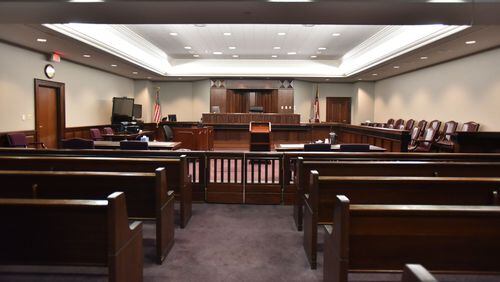When you vote next month, if you haven't done so already, you will eventually get to the bottom of a long ballot, where you will be asked this question:
"Shall the Constitution of Georgia be amended so as to provide certain rights to victims against whom a crime has allegedly been perpetrated and allow victims to assert such rights?"
Unless you are a naturally gifted geek, or are paid to play one in the newspaper, you do not know what these “certain rights” might be.
Even so, you will probably vote "yes" – because all victims deserve protection, and because a California billionaire wants you to. In the name of his dead sister, murdered 35 years ago, Henry Nicholas has dropped $8.3 million in Georgia to get "Marsy's Law" on the ballot as Amendment 4 — and into the Georgia Constitution.
Nicholas, who made his fortune in semiconductors, has shelled out tens of thousands of dollars to the most influential political strategists and activists in the state, Democratic and Republican alike.
Millions have been spent on TV ads. Which is why, betwixt and between denunciations of Stacey Abrams and Brian Kemp as existential threats to humankind, you’ve also watched the actor Kelsey Grammer talk of his murdered father and sister, and a local woman describe the acid attack by an ex-boyfriend that put her in a coma.
Christy Sims says prosecutors never told her that an acid-flinging boyfriend was back on the streets. Grammer found out his dad’s killer had been released via the National Enquirer. “Amendment 4 gives crime victims and their families a voice in the process and the equal rights they deserve,” he argues.
And Nicholas still fumes that, back in 1983, his mother came face-to-face with his sister’s killer in a grocery store, unaware that he had made bail.
All of that is powerful stuff. So powerful that it has erased political boundaries. U.S. Rep. John Lewis, D-Atlanta, rarely agrees with U.S. Sen. David Perdue, R-Ga., but both endorsed Marsy’s Law.
But Amendment 4 is special for another reason, too. Two respected Georgia institutions, one liberal and one conservative, have both expressed doubts about the very idea of Marsy’s Law.
"I must be the only person in Georgia who's opposed to this," said Benita Dodd, vice president of the Georgia Public Policy Foundation. Informed that the state chapter of the ACLU has similarly raised a red flag, Dodd amended her statement.
“I must be the only free-market, limited-government person opposed to this,” she said.
Nicholas is engaged in a state-by-state campaign. Georgia is one of six that have it on the November ballot. Ultimately, the billionaire would like to see Marsy’s Law as part of the U.S. Constitution.
But each state version of Marsy’s Law has been slightly different than the next, which to Dodd smacks of experimentation. Georgia already has what is perhaps the strongest victim’s rights statute in the country, passed in 1996 – aimed at keeping victims informed about the where and whither of past assailants.
“Why has nobody in Georgia done a study to determine how big the problem is before we put it in the Constitution – where it’s extremely difficult to undo?” Dodd asked.
Which brings us back to those “certain rights” you’ve been asked to approve. Ballot amendment questions are often akin to campaign slogans — they’re not only vague, but often the wording is intended to push the voter in a specific direction.
The ballot question at the top of this column hasn’t changed much since Marsy’s Law was introduced by state Sen. John Kennedy, R-Macon, in February 2017. But the “certain rights” behind it have.
As originally conceived, Senate Resolution 146 gave victims the right "to have criminal and delinquency proceedings occur without unreasonable delay." Defendants have a right to a speedy trial, but the clause raised the possibility of clashing timetables between the accused and the alleged victim.
That provision has disappeared.
More significantly, the earliest version of SR 146 also would have established a victim’s right “to refuse to be interviewed by the accused, or an individual acting on behalf of the accused.”
Which, one could argue, would contradict a defendant's right to face his accuser, as outlined in the Sixth Amendment of the U.S. Constitution.
That’s gone now, too.
(Similar language didn't disappear from the North Dakota iteration of Marsy's Law, passed in 2016. It gave victims the right to keep confidential "information or records that could be used to locate or harass a victim or the victim's family." By declaring themselves victims, law enforcement officers in that state have begun using that provision to keep their names private in wrongful death investigations.)
Several changes were made to SR 146 before Georgia’s state Senate passed Marsy’s Law in March 2017. In the House, state Rep. Rich Golick, R-Smyrna, chairman of the committee that handles criminal legal matters, took charge of the proposal.
Working with state prosecutors, more adjustments were made. “There were initial concerns about how this would work,” Kennedy said.
The final version of Marsy’s Law, approved by both House and Senate last March, is an “opt in” system in which victims must make known their interest in being informed about the details of a criminal case. “Nothing compels a victim to be involved more than they want to be involved,” Kennedy said.
It also means that Georgia’s courts won’t be obliged to create a new, expanded system to keep track of every victim of every crime for scores of years.
Upon request, victims will have the right “to reasonable, accurate, and timely notice of the arrest, release, or escape of the accused.” And the right to be heard at hearings “involving the release, plea, or sentencing of the accused.” At those hearings, victims can have a lawyer present, but the state isn’t obliged to provide one.
The version of Marsy’s Law you’re being asked to approve also has something that Henry Nicholas might not have wanted – a list of rights that victims won’t have.
They won’t have the right to appeal any decision made in a criminal proceeding, or the right to appeal a verdict or a sentence.
Nor will Georgia’s version of Marsy’s Law confer upon victims “the equal rights they deserve,” as demanded by Kelsey Grammer in that ad. On the matter of whose rights are supreme in a criminal trial — those of the accused or the alleged victim – SR 146 is most particularly silent.
“I don’t think there’s anything about this bill that arguably infringes on any defendants’ rights,” Kennedy said.
“We intentionally left it with the flexibility that the judge would need to find the appropriate time and place and opportunity for the victim to be heard,” Kennedy said. “Because the judge is going to have to balance these rights of the victim with all of the other rights that are going on in the middle of a trial — that have to be respected.”
Maybe that’s worth $8.3 million. But it sounds very much like something we already had — for free.
About the Author








